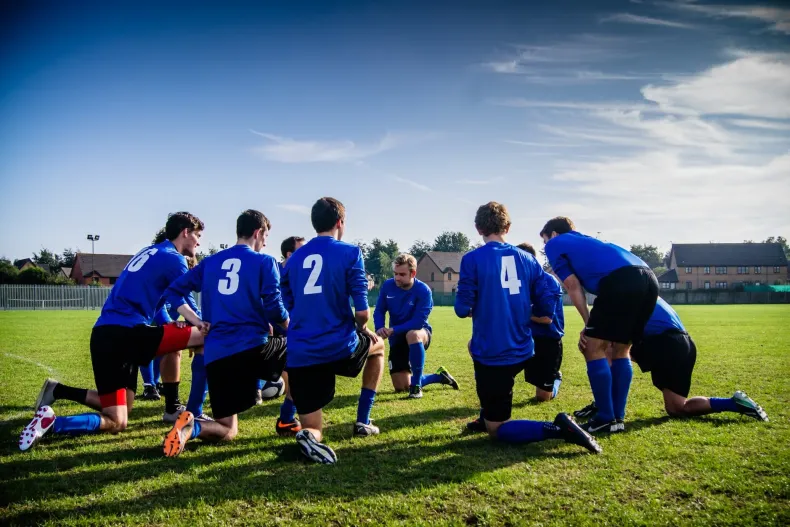When it comes to sports, coaches are the unsung heroes behind the scenes, molding raw talent into refined expertise and guiding athletes toward their peak performance.
Yet, what distinguishes a great coach from the myriad of good ones isn’t just their comprehensive knowledge of the sport or their tactical insight. It’s a set of distinctive qualities and developed skills that inspire and push athletes to rise above their limits.
This article delves into the essential qualities that every sports coach possesses, shining a light on what makes them truly exceptional.
From their passion for the sport to their commitment to lifelong learning, effective communication, and deep empathy, we explore the keystone attributes that contribute to their success and, by extension, the success of their athletes.
1. Motivational Ability
Perhaps one of the most influential qualities of a good coach is their ability to motivate and inspire their athletes.
Coaches with this ability understand how to push athletes to exceed their perceived limits while maintaining a supportive and positive environment.
They know when to offer encouragement, how to set challenging yet achievable goals, and the right moments to provide constructive criticism.
This motivational skill is critical for helping athletes overcome obstacles, persevere through setbacks, and achieve their full potential.
2. Lifelong Learner
Great coaches understand that the domain of sports is ever-evolving, and staying at the forefront requires a commitment to continuous education.
This quality of being a lifelong learner keeps them updated with the latest coaching techniques, sports science, and psychological strategies to enhance athlete performance.
Many successful coaches even pursue further education, such as a sports administration degree online, to deepen their understanding.
These online degrees are particularly beneficial as they allow coaches to manage their professional commitments while simultaneously advancing their education.
This dedication to learning highlights a coach’s commitment to not just personal growth but also to elevating the standards of their coaching to benefit their athletes.
3. Strong Communication Skills
Effective communication is essential for successful coaching. The ability to convey ideas clearly and concisely, provide constructive feedback, and listen actively forms the base of a strong coach-athlete relationship.
Coaches are adept at adjusting their communication style to match the individual needs of their athletes, ensuring that each member of the team feels heard, understood, and valued.
Whether it’s understandably articulating complex tactics or offering words of encouragement, a coach’s communication skills are instrumental in building trust and fostering a cohesive team environment.
4. Empathy and Understanding
The ability to empathize with athletes and recognize their struggles, ambitions, and pressures sets good coaches apart.
This quality allows coaches to connect with athletes on a personal level, building a foundation of trust and mutual respect.
By understanding the unique challenges each athlete faces, coaches can tailor their approach to meet the athlete’s needs, providing support that goes beyond the physical aspects of training. Empathy in coaching ensures that athletes not only excel in their sport but also grow as individuals, learning valuable life lessons along the way.
5. Leadership and Integrity
Leadership is a pivotal quality for any coach, but enthusiastic coaches distinguish themselves through their unwavering integrity.
 They lead by example, demonstrating the values they wish to instill in their athletes, such as discipline, respect, and sportsmanship.
They lead by example, demonstrating the values they wish to instill in their athletes, such as discipline, respect, and sportsmanship.
This consistent display of character builds a strong, positive team culture and earns the respect and trust of their athletes, fostering an environment where everyone is motivated to give their best.
6. Adaptability
The field of sports is unpredictable, and the ability to adapt to changing circumstances is crucial for a coach’s success.
Coaches possess the flexibility to adjust their coaching strategies to meet the evolving needs of their team and the challenges posed by competitors.
This adaptability extends to understanding and accommodating the diverse personalities and learning styles of their athletes, ensuring that each individual can thrive under their guidance.
7. Strategic Thinking
Coach is also a master strategist, capable of developing game plans that leverage their team’s strengths and exploit their opponent’s weaknesses.
This quality involves a deep analytical understanding of the sport, as well as the foresight to anticipate opponents’ moves and the creativity to devise innovative tactics.
Strategic thinking also encompasses the ability to make quick, decisive adjustments during competition, a skill that can often mean the difference between victory and defeat.
Conclusion
The journey to becoming a good sports coach is multifaceted, requiring a combination of personal integrity, strategic insight, and a deep understanding of human psychology.
The qualities discussed—from the ability to inspire and motivate to strategic thinking, adaptability, and leadership—form the essence of great coaching.
These attributes go beyond mere technical knowledge of the sport; they embody the heart and soul of what it means to lead, inspire, and shape the lives of athletes.
Coaches understand that their impact extends far beyond wins and losses; they play a crucial role in developing character, resilience, and teamwork in their athletes. By cultivating these qualities, coaches not only enhance their effectiveness but also contribute to the broader narrative of sports as a powerful tool for personal growth and societal cohesion.





